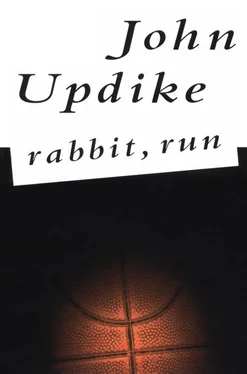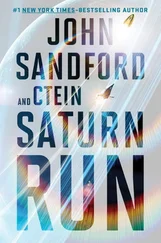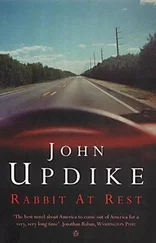Eccles asks the man, "Do you think too that Harry will come around?"
"No," Angstrom says, looking down, "never. He's too far gone. He'll just slide deeper and deeper now until we might as well forget him. If he was twenty, or twenty—two; but at his age . . . In the shop sometimes you see these young Brewer bums. They can't stick it. They're like cripples only they don't limp. Human garbage, they call them. And I sit there at the machine for two months wondering how the hell it could be my Harry, that used to hate a mess so much."
Eccles looks over at Harry's mother and is jarred to see her leaning against the sink with soaked cheeks gleaming under the glasses. He gets up in shock. Is she crying because she thinks her husband is speaking the truth, or because she thinks he is saying this just to hurt her, in revenge for making him admit that he had wanted her? "I hope you're wrong," Eccles says. "I must go now; I thank you both for discussing this with me. I realize it's painful."
Angstrom takes him back through the house and in the dark of the dining room touches his arm. "He liked things just so," he says. "I never saw a boy like him. Any rumpus in the family he'd take hard out of all reason – when Mary and I, you know, would have our fun." Eccles nods, but doubts that "fun" quite describes what he's seen.
In the living—room shadows a slender girl stands in a barearmed summer dress. "Mim! Did you just get in?"
"Yeah."
"This is Father – I mean Reverend ='
"Eccles."
"Eccles, he came to talk about Harry. My daughter Miriam." "Hello, Miriam. I've heard Harry speak very fondly of you."
"Hi."
With that word the big window behind her takes on the intimate glaze of the big window in a luncheonette. Flip greetings seem to trail behind her with wisps of cigarette smoke and drugstore perfume. Mrs. Angstrom's nose has delicacy on the girl's face, a sharpness Saracen or even more ancient, barbaric. Taken with the prominent nose her height at first glance seems her mother's, but when her father stands beside her, Eccles sees that it is his height; their bodies, the beautiful girl's and the weary man's, are the same. They have the same narrowness, and a serviceable vulgarity that offends him. They'll get through. They know what they're doing. It's a weakness of his, to prefer people who don't know what they're doing. The helpless: these, and the people on top, beyond help. The ones who maneuver more or less well in the middle seem to his aristocratic prejudices to be thieving from both ends. When they bunch at the door, Angstrom puts his arm around his daughter's waist and Eccles thinks of Mrs. Angstrom silent in the kitchen with her wet cheeks and red arms, a mad captive. Yet, turning on the pavement to wave at the two of them in the doorway, he has to smile at their incongruous symmetry, the earringed Arab boy with her innocent contempt for his eunuch's collar, and the limp—faced old woman of a printer, paired in slenderness, interlocked.
He gets into the Buick thirsty and vexed. There was something pleasant said in the last half—hour but he can't remember what it was. He feels scratched, hot, confused, and dry; he's spent an afternoon in a bramble patch. He's seen half a dozen people and a dog and nowhere did an opinion tally with his own, that Harry Angstrom was worth saving and could be saved. Instead down there between the brambles there seemed to be no Harry at all: nothing but stale air and last year's dead stalks. The day is declining through the white afternoon to the long blue spring evening. He drives past a corner where someone is practicing on a trumpet behind an open upstairs window. Du du do do da da dee. Dee dee da da do do du. Cars are whispering home from work. He drives across the town, tacking on the diagonal streets along a course parallel to the distant ridge of the mountain. Fritz Kruppenbach, Mt. Judge's Lutheran minister for twenty—seven years, lives in a high brick house not far from the cemetery. The motorcycle belonging to his college—age son is on its side in the driveway, partly dismantled. The sloping lawn, graded in fussy terraces, has the unnatural chartreuse evenness that comes with much fertilizing, much weed—killing, and much mowing. Mrs. Kruppenbach – will Lucy ever achieve that dimpled, obedient look? – comes to the door in a dark wool dress that makes no compromise with the season. Her gray hair girdles her head with braids of great compactness. When she lets all that hair down, she must be a witch. "He's mowing out back," she says.
"I'd like to talk to him for just a few minutes. It's a problem that involves our two congregations."
"Go up to his room, why do—an tcha? I'll fetch him."
The house – foyer, halls, staircase, even the minister's leathery den upstairs – is flooded with the smell of beef roasting. Eccles sits by the window of Kruppenbach's den on an oak—backed choir pew left over from some renovation. Seated on the bench he feels an adolescent compulsion to pray but instead peers across the valley at the green fragments of the golf course where he would like to be, with Harry. Eccles has found other partners either better or worse than he; only Harry is both, and only Harry gives the game a desperate gaiety, as if they are together engaged in an impossible quest set by a benevolent but absurd lord, a quest whose humiliations sting them almost to tears but one that is renewed at each tee, in a fresh flood of green. And for Eccles there is an additional hope, a secret detennination to trounce Harry. He feels that the thing that makes Harry unsteady, that makes him unable to repeat his beautiful effortless swing every time, is the thing at the root of all the problems that he has created; and that by beating him decisively he, Eccles, will get on top of this weakness, this flaw, and hence solve the problems. In the meantime there is the pleasure of hearing Harry now and then cry, "Hey, hey," or "I love it, love it!" Their rapport at moments attains for Eccles a pitch of pleasure, a harmless ecstasy, that makes the world with its vicious circumstantiality seem remote and spherical and green.
The house shudders to the master's step. Kruppenbach comes up the stairs into his den, angry at being taken from his lawnmowing. He wears old black pants and an undershirt soaked with sweat. His shoulders are coated with wiry gray wool.
"Hello, Chack," he says at pulpit volume, with no intonation of greeting. His German accent makes his words seem stones, set angrily one on top of another. "What is it?"
Eccles, not daring "Fritz" with the older man, laughs and blurts, "Hello!"
Kruppenbach grimaces. He has a massive square head, crewcut. He is a man of brick: as if he was born as a baby literally of clay and decades of exposure have baked him to the color and hardness of brick. He repeats, "What?"
"You have a family called Angstrom."
"Yes."
"The father's a printer."
"Yes."
"Their son, Harry, deserted his wife over two months ago; her people, the Springers, are in my church."
"Yes, well. The boy. The boy's a Schussel."
Eccles isn't certain what that means. He supposes that Kruppenbach doesn't sit down because he doesn't want to stain his furniture with his own sweat. His continuing to stand puts Eccles in a petitionary position, sitting on the bench like a choirboy. The odor of meat cooking grows more insistent as he explains what he thinks happened: how Harry has been in a sense spoiled by his athletic successes; how the wife, to be fair, had perhaps showed little imagination in their marriage; how he himself, as minister, had tried to keep the boy's conscience in touch with his wife without pressing him into a premature reunion, for the boy's problem wasn't so much a lack of feeling as an uncontrolled excess of it; how the four parents, for various reasons, were of little help; how he had witnessed, just minutes ago, a quarrel between the Angstroms that perhaps offered a clue as to why their son
Читать дальше












